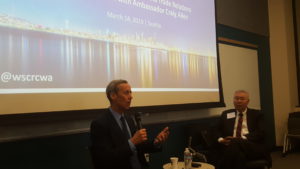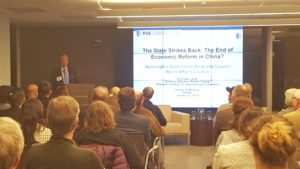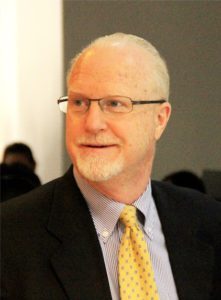 On March 14, 2019, Ambassador Craig Allen, President of the US-China Business Council and a former commercial diplomat to China, guided a lively interactive discussion on the current state and the future of the U.S.-China trade relations. He shared his expert insights on where the bilateral relationship is headed, including the dynamics at play in the ongoing negotiations, what to expect from the potential meeting between the two leaders in late-March, as well as the potential impact of reforms to export controls and investment restrictions to companies in the high-tech space. Amb. Allen argued that the current trade war would very likely morph into a technology war.
On March 14, 2019, Ambassador Craig Allen, President of the US-China Business Council and a former commercial diplomat to China, guided a lively interactive discussion on the current state and the future of the U.S.-China trade relations. He shared his expert insights on where the bilateral relationship is headed, including the dynamics at play in the ongoing negotiations, what to expect from the potential meeting between the two leaders in late-March, as well as the potential impact of reforms to export controls and investment restrictions to companies in the high-tech space. Amb. Allen argued that the current trade war would very likely morph into a technology war.
U.S.-China-Japan: The Evolving Trade Landscape
On March 13, 2019, the Japan-America Society of the State of Washington, the WSCRC, Port of Seattle, World Trade Center of Tacoma, and the Northwest Seaport Alliance co-hosted a panel discussion on the ever-evolving trade landscape between the U.S., China, and Japan. A panel of experts from the state government, the ports, and local businesses shared their insights on key issues in U.S.-China-Japan trade relations, what businesses are experiencing in their day-to-day operations in the region and in overseas markets, and the implications of these trade relations.
Please watch a video of the event here.
Book Talk with Dr. Nick Lardy: The End of Economic Reform under Xi Jinping
 On January 23, 2019, Dr. Nicholas Lardy, the Anthony M. Solomon Senior Fellow at the Peterson Institute for International Economics and a renowned expert on the Chinese economy, presented to a large crowd at the Dorsey and Whitney about his new book, The State Strikes Back: the End of the Economic Reform. Dr. Lardy argued that China’s recent slowing economic growth is not the result of the natural maturing of an economy, but rather may reflect the diminished pace of economic form and the resurgence of the state in resource allocation since President Xi Jinping assumed power in 2012. His talk highlighted numerous examples of the growing tilt towards the state sector, such as the delinking of credit allocation with differences between state and private sector firm rates of return on assets and the impacts of enterprise subsidies.
On January 23, 2019, Dr. Nicholas Lardy, the Anthony M. Solomon Senior Fellow at the Peterson Institute for International Economics and a renowned expert on the Chinese economy, presented to a large crowd at the Dorsey and Whitney about his new book, The State Strikes Back: the End of the Economic Reform. Dr. Lardy argued that China’s recent slowing economic growth is not the result of the natural maturing of an economy, but rather may reflect the diminished pace of economic form and the resurgence of the state in resource allocation since President Xi Jinping assumed power in 2012. His talk highlighted numerous examples of the growing tilt towards the state sector, such as the delinking of credit allocation with differences between state and private sector firm rates of return on assets and the impacts of enterprise subsidies.
Navigating the World of the U.S.-China Trade War and Technology Distrust: A Conversation with James McGregor
On January 8, 2019, James McGregor, Chairman of Greater China, APCO Worldwide, shared his insights on the current status of U.S.-China relations. He argued that the current trade war is not another downturn in U.S-China relations, but rather a paradigm shift that’s uncertain how it will end. James suggested that joining a trade pact such as TTP would allow for the two different systems to form an enforceable, multilateral and rule-based trading framework.
Washington State China Relations Council appoints J. Norwell Coquillard as the new Executive Director
 Marc Berger, the Chairman of the Washington State China Relations Council announced that . J. Norwell Coquillard have been appointed as the new Executive Director of the WSCRC.
Marc Berger, the Chairman of the Washington State China Relations Council announced that . J. Norwell Coquillard have been appointed as the new Executive Director of the WSCRC.
Mr. Coquillard’s background includes over 33 years of living in Asia primarily in Japan and China. For the major share of that time he was President of the agribusiness firm, Cargill Incorporated, in those two countries. He moved from Tokyo to Shanghai in 1998 and witnessed the tremendous change and development that China experienced during those 18 years. In his time in China he helped Cargill build a business from one that employed approximately 300 people in four locations to one that had over 5,000 employees in over 40 operations nationwide. Mr. Coquillard served as the Chairman of the American Chamber of Commerce in Shanghai (Amcham) from 2008 to 2009. From 2010 until returning to the U.S. in 2016, he ran the China branch of the international non-profit, Enactus.
- « Previous Page
- 1
- …
- 18
- 19
- 20
- 21
- 22
- …
- 35
- Next Page »